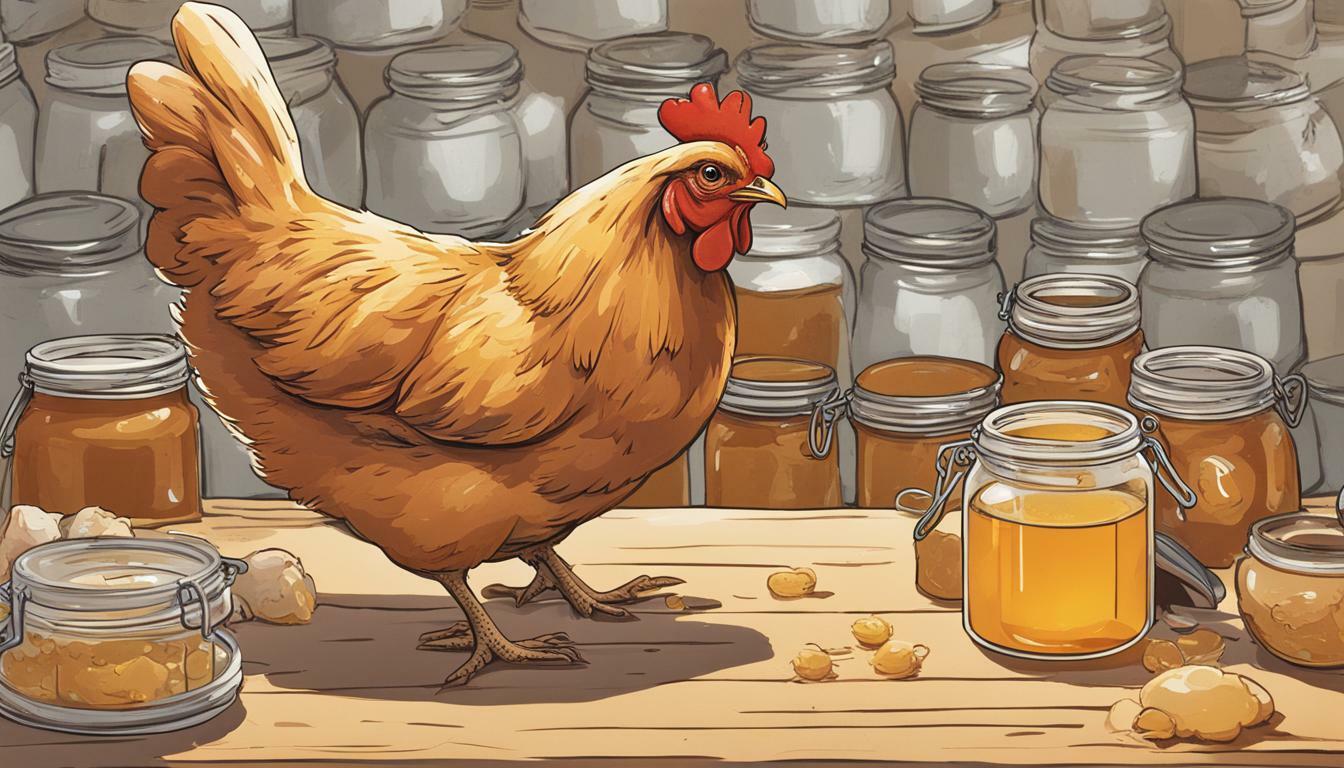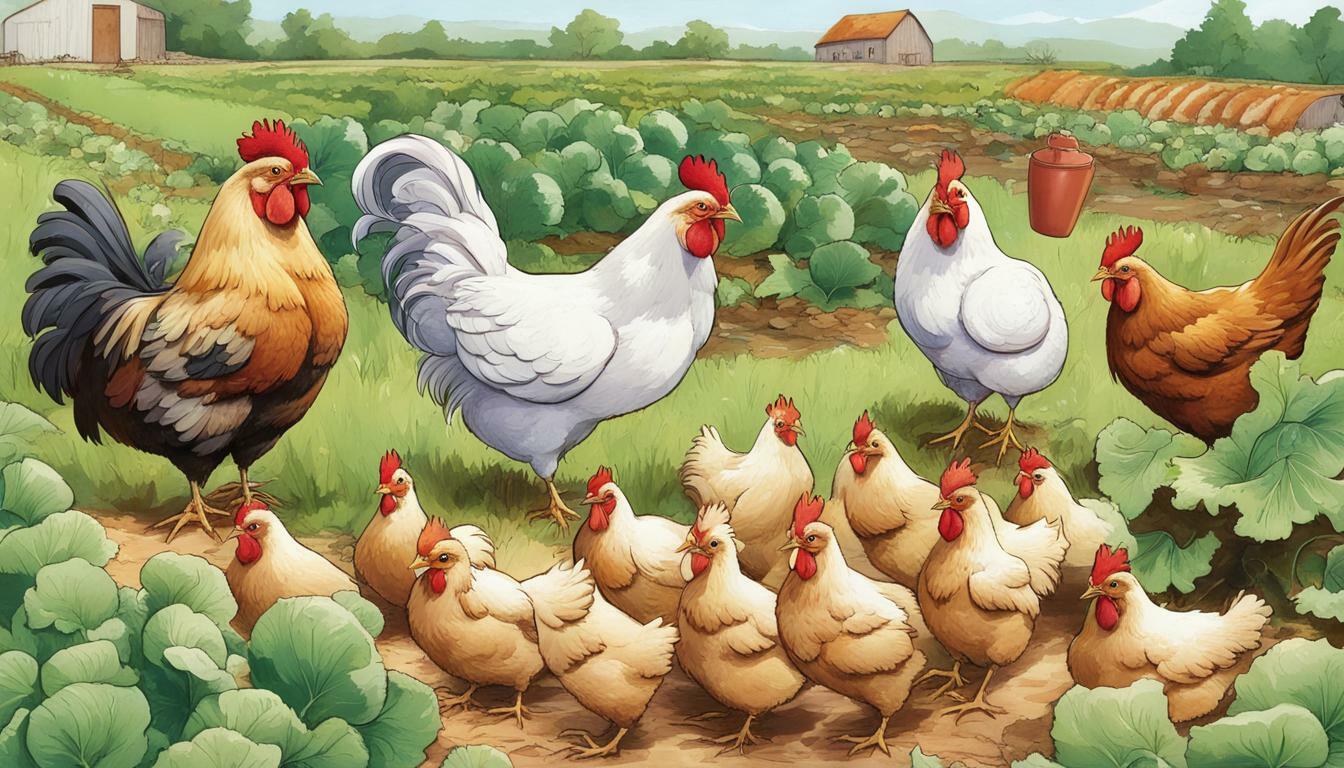Can Chickens Eat Honey? Discover the Surprising Answer!

Table of content:
Honey is a popular natural sweetener that many people enjoy in tea, baked goods and more. If you have backyard chickens or a small flock, you may wonder if you can share some of this sweet treat with your hens or roosters.
Let’s explore the answer to: can chickens eat honey?
Is Honey Safe for Chickens?
Honey itself is generally considered safe for chicken consumption in small amounts. However, there are a few things to keep in mind:
- Raw or unpasteurized honey has a small risk of containing bacteria or spores that could make chickens sick. Pasteurized honey eliminates this risk.
- Honey should only be fed in moderation as it is high in natural sugars. Too much can cause digestive upset.
- Local honey may provide extra immune benefits for chickens. But honey from unknown sources could contain toxins from certain plants.
So as long as you give small portions of pasteurized, high-quality honey, it can be a nutritious treat for chickens. Monitor them to ensure no adverse effects.
What Happens If Chickens Eat Honey?
Honey can offer some potential health benefits for chickens:
- It provides a boost of beneficial nutrients, enzymes, antioxidants and phytonutrients. This supports overall health and egg production.
- The natural probiotics in raw, unprocessed honey can support healthy gut bacteria. This aids digestion and immunity.
- Honey has antimicrobial and antibacterial properties that may boost immunity and fight illness. It may help combat common chicken issues like e.coli, coccidiosis or salmonella.
- The prebiotic fiber in honey may promote growth of healthy gut bacteria. This helps reduce bad bacteria that can cause digestive issues.
However, eating too much honey can also cause problems like loose stool, diarrhea or sticky, messy feathers. Moderation is key for happy, healthy chickens.
Do Chickens Like Honey?
Most chickens love honey and view it as an irresistible treat. The sweet taste appeals to their natural foraging instincts. The thick, sticky texture also keeps them engaged and entertained.
Some key signs chickens enjoy honey include:
- Excited pecking and gobbling when offered honey
- Willingness to work for honey, such as pecking at a honey-filled toy
- Following humans closely when they have honey
- Aggressive behavior like pushing and shoving to access honey
Younger chickens and chicks may be especially fond of the sweet flavor. It’s best to feed them honey in very small amounts to avoid over consumption.
Overall, honey’s popularity shows it can be a valuable enrichment for birds kept in backyards or small farms.
Will Honey Hurt Chickens?
When fed responsibly, honey is unlikely to hurt chickens. However, problems can occur if chickens have too much honey.
Potential issues include:
- Diarrhea – Excess fructose from honey can cause loose droppings.
- Sticky feathers – Honey can clump feathers, attracting dirt and parasites.
- Overweight – Too many sugary calories may lead to obesity.
- Digestive issues – Too much honey stresses the gut, causing inflammation or dysbiosis.
- Candida overgrowth – The natural sugars may feed fungal yeast like candida in the gut.
Luckily, these issues can be avoided by sticking to a few small servings per week. Ideally one teaspoon or less per full grown chicken.
For mega added safety, look for raw, unfiltered local honey which has extra immunity benefits.
Can I Feed My Chickens Honey?
Yes, you can safely feed your backyard chickens honey in moderation. Follow these tips:
- Start with just a 1⁄4 teaspoon of honey per chicken. Slowly increase to 1 teaspoon at most.
- Serve honey 2-3 times per week at first. Monitor for any digestive issues.
- Look for raw, local honey for the most nutrients and health perks. Avoid pasteurized honey from the store.
- Mix honey into chicken feed or serve in a communal treat ball. This prevents bullying or overeating.
- Provide ample, fresh water to help dilute the sugary honey.
- Remove honey if chickens show signs of diarrhea, weight gain or other problems.
With a responsible, controlled approach, honey is a safe, nutritious treats for chooks. Its antibacterial properties support immunity, while the taste and texture keep them happily entertained.
Is Honey Bad for Chickens?
Raw honey from a safe source is not inherently bad for chickens. In fact, honey provides key benefits:
- Antioxidants – Honey contains antioxidants like flavonoids which reduce oxidative stress and inflammation.
- Probiotics – Raw, unfiltered honey contains beneficial “live” cultures like lactobacilli and bifidobacteria for gut health.
- Prebiotics – Honey contains oligosaccharides and enzyme-rich pollen which promotes good gut flora.
- Antimicrobial properties – Honey inhibits bacterial pathogens like salmonella, e. coli and staphylococcus.
- Soothes respiratory issues – Honey can coat and soothe a sore, inflamed throat.
The main risks come from overfeeding honey or using an unsafe source. As long as you stick to a teaspoon or less per chicken, high quality honey offers key nutritional and immunity boosts.
Should You Give Chickens Honey?
Here are some pros and cons of sharing honey with backyard chickens:
Pros
- Satisfies natural foraging instinct
- Provides variety and enrichment
- Packed with beneficial nutrients
- Delicious treat chickens love
- Antimicrobial and prebiotic benefits
- Safe in small doses
Potential Cons
- High in natural sugar
- Can cause digestive upset
- Raw honey may contain bacteria
- Sticky mess on feathers
- Chance of overeating or obesity
- Could feed fungal gut infections
Overall, honey is a healthy, nutritious feed supplement when fed responsibly. The small risks can be mitigated by sticking to 1 teaspoon or less per chicken 2-3 times per week. For top safety, choose raw local honey from a reputable source.
Can You Give Honey to Baby Chicks?
You can offer diluted honey water to chicks over 3-4 weeks old in small amounts. Here are some tips:
- Wait until chicks are fully feathered and off heat lamps before giving honey. Their sensitive digestive systems need time to mature.
- Dilute honey with 5 parts water to 1 part honey. Too much concentrated sugar can harm young chicks.
- Limit honey water to 1-2 teaspoons per chick, 2-3 times weekly. Only provide what they can finish in one sitting.
- Ensure chicks have unlimited access to plain chick starter feed and fresh water to avoid over consuming honey water.
- Monitor for signs of digestive upset like loose stool, decreased appetite or lethargy. Discontinue honey if these occur.
With a cautious approach, small amounts of diluted honey can provide useful nutrition and prebiotics for chicks over 3-4 weeks old. But their young systems are sensitive, so honey should never be a dietary staple.
How Much Honey Can Chickens Have?
The recommended honey limits for chickens are:
- Baby chicks – 1-2 teaspoons of diluted honey 2-3 times weekly.
- Adult hens – 1 teaspoon of pure honey 2-3 times per week.
- Roosters – 1 teaspoon 2-3 times weekly.
Exceeding these amounts risks health issues like diarrhea, yeast overgrowth, obesity and sticky feathers.
To encourage moderation, try mixing honey into feed, offering it in a treat ball, or smearing it thinly inside a chicken swing or toy.
Avoid offering free-choice, unlimited honey. The natural sugar content leads to addictive overeating behavior in many birds.
With a controlled, limited approach, honey can be a safe, nutritious additive to a chicken’s diet. Moderation and oversight prevents overindulgence issues.
Will Chickens Get Sick from Honey?
In general, chickens are unlikely to get sick from eating small, infrequent amounts of honey. However, some potential risks include:
- Diarrhea – Too much fructose from honey can draw extra water into the gut, causing loose droppings. Reduce honey amounts if this occurs.
- Candida overgrowth – The natural sugars in honey can feed yeast like candida already living in the chicken’s digestive tract. Monitor for symptoms.
- Sticky feathers – Honey clinging to feathers can lead to matting and damage. Avoid letting chickens walk through spilled honey.
- Obesity – Overconsuming any treat, including honey, contributes excess calories leading to overweight birds.
- Digestive inflammation – Too much concentrated sugar from honey stresses the gut lining. Watch for signs like decreased appetite.
With proper dosage of 1 teaspoon or less, 2-3x weekly, honey is unlikely to sicken backyard chickens. Discontinue honey at the first sign of any adverse reaction.
Conclusion
Can chickens eat honey? Yes, in moderation! About 1 teaspoon, 2-3 times weekly is a safe amount for most adult chickens. Be sure to use raw, local honey for maximum benefits. Dilute honey for chicks under 4 weeks old. Monitor your flock for any signs of digestive distress. With a careful approach, honey can be a nutritious, immune-boosting treat chickens love.
Welcome. I’m Adreena Shanum, the proud owner of this website, and I am incredibly passionate about animals, especially poultry. I founded adreenapets.com as a labor of love, stemming from my desire to share my knowledge and experiences with poultry enthusiasts worldwide.




